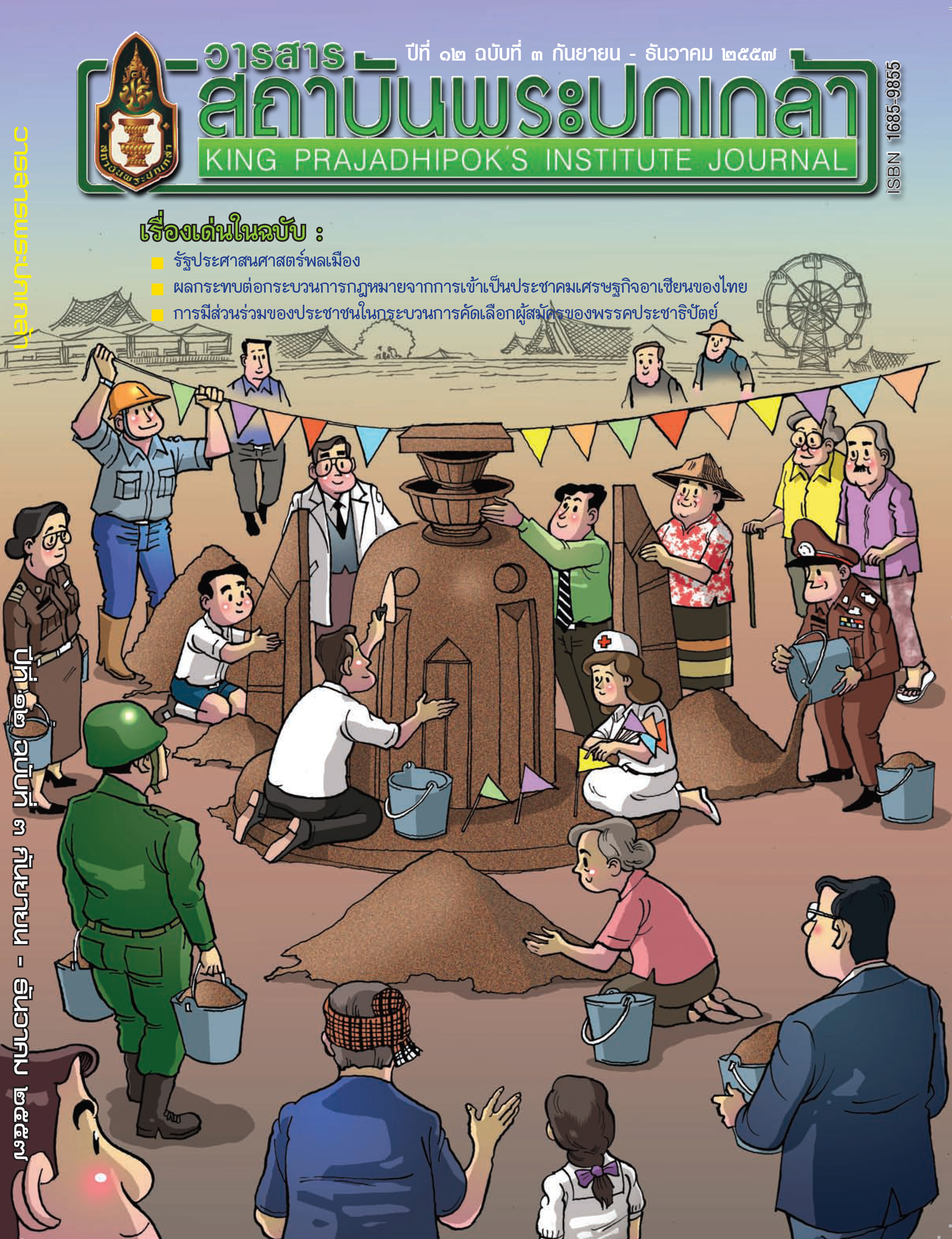Civic Public Administration
Main Article Content
Abstract
The present study proposes civic public administration as a new approach to the field.The author defines civic public administration as an administration that seeks firstly to help the people, particularly the poor, to help themselves, secondly to strengthen civic associations, and thirdly to boost the role and capacity of local governments. The author points out, through a literature review, that public administration as a field of study came of age first as old public administration, giving virtually no role to the people except as beneficiaries of government policy or subjects to law. Later, there emerged a new approach called public management giving a substantial role to business and people in public policy making and public administration. Most recently, new public service has arisen as a major approach in the discipline asking public administration to give the center stage to the making of citizenship. Civic public administration builds on top of the new public service. In practice Thailand has had some civic public administration at various levels, witnessing the revival or the rise of civic associations, local communities, multifarious volunteer organizations and activities, and local governments. There remains the task of inculcating the government, civil society, the people, and communities with the principle of civic public administration, and improving or streamlining those already in practice with all available resources and means.
Article Details
@ 2020 King Prajadhipok's Institute The Government Complex Commemorating All Right Reserved.
References
เดวิด แม๊ทธิว. ๒๕๔๒. ในหนังสือ พลเมืองไทย ณ จุดเปลี่ยนศตวรรษ. ศ. ดร.อนุชาติ พวงสาลี บรรณาธิการ. กรุงเทพฯ: สถาบันเพื่อการเรียนรู้สังคม.
ถวิลวดี บุรีกุลและรัชวดี แสงมหะหมัด. ๒๕๕๕. ความเป็นพลเมืองในประเทศไทย. นนทบุรี: สถาบันพระปกเกล้า. เผยแพร่ในการประชุมวิชาการสถาบันพระปกเกล้า ครั้งที่ ๑๓ ณ ศูนย์ประชุมสหประชาชาติ วันที่ ๒๒-๒๔ มีนาคม ๒๕๕๕.
ทศพร ศิริสัมพันธ์. ๒๕๕๔. การทำงานแบบมีส่วนร่วมของหน่วยงานภาครัฐและภาคส่วนอื่น. กรุงเทพฯ: สำนักงานคณะกรรมการพัฒนาระบบราชการ (กพร.).
ปริญญา เทวานฤมิตรกุล. ๒๕๕๕. หนังสือการศึกษาเพื่อสร้างพลเมือง. กรุงเทพฯ: นานมีบุ๊คพับลีช.
วรากรณ์ สามโกเศศ. การศึกษาเพื่อสร้างพลเมือง. มติชน ฉบับวันที่ ๓ มีนาคม ๒๕๕๔.
วลัยพร รัตนเศรษฐ. ๒๕๔๙. ดุลยภาพของข้าราชการและฝ่ายการเมือง. นนทบุรี: สถาบันพระปกเกล้า.
วลัยพร รัตนเศรษฐ. ๒๕๕๓. งานวิจัยโครงการนวัตกรรมการเรียนรู้โครงการแก้ไขปัญหาอาชญากรรมและพฤติกรรมไม่เหมาะสมของเด็กและเยาวชน กรณีซิ่ง ซ่า มั่วเซ็กส์ เสพยา (โครงการ ๓ ซ.) สำนักงานจังหวัดจันทบุรี.
เสรี พงษ์พิศ. ๒๕๓๗. หนังสืออุดมศึกษาเพื่อชีวิตและชุมชน. สถาบันการเรียนรู้เพื่อปวงชน.
อุทัย เลาหวิเชียร, ๒๕๔๔. รัฐประศาสนศาสตร์: ลักษณะวิชาและมิติต่างๆ. กรุงเทพฯ: สถาบันบัณฑิตพัฒนบริหารศาสตร์.
อรทัย ก๊กผล. ๒๕๕๒. หนังสือการจัดบริการสาธารณะท้องถิ่น. นนทบุรี: สถาบันพระปกเกล้า.
เอนก เหล่าธรรมทัศน์. ๒๕๕๒. แปรถิ่นเปลี่ยนฐาน: สร้างการปกครองท้องถิ่นให้เป็นรากฐานของประชาธิปไตย กรุงเทพฯ: มหาวิทยาลัยธรรมศาสตร์.
เอนก เหล่าธรรมทัศน์. ๒๕๕๔. การเมืองของพลเมือง. กรุงเทพฯ: สถาบันพระปกเกล้า, พิมพ์ครั้งที่ ๓.
เอนก เหล่าธรรมทัศน์. ๒๕๕๕. การกระจายอำนาจ=การคืนอำนาจสู่การจัดการตนเองของชุมชน ท้องถิ่น และสังคม, สำนักงานปฏิรูป (สปร.).
Appleby Paul. 1969. “Government is Different”, in Michael D. Reagan (ed), The Administration of Public Policy. Illinois Scoll, Foreman and company.
Dahl, Robert A. 1947. The science of Public Administration: Three Problems. Public Administration Review Winter.
David Osborne and Ted Gaebler. 1993. Reinventing Government. Plume of Penguin Books: New York.
Gaus, John M. 1947. Reflection on Public Administration University. Allabama: University of Allabama Press.
Gerth, H. H. and Bills, C. Wright. 1946. From Max Weber: Essay in Sociology. New York: Oxford University Press.
Good now, Frank J. 1900. Political and Administration New York: McMillan.
Harry C. Boyte. 2004. Everyday Politics: Reconnecting Citizens and Public Life. University of Pennsylvania Press.
Henry, Mintzburg. 1996. Managing Government, Harvard Business Review. HBR May – June.
Hood, Christopher. 1991. Public Management All Seasons. Volume 69, Issue 1, Monck.
Long, Norton E. 1962. The Polity. Chicago: Rand McNally Co.
Marini, Frank (ed.) 1971. Toward a New Public Administration: The Minnow brook Perspective Scranton: Chandler Publishing Co.
Mary E. Guy, Meredith A. Newman, and Sharon H. Mastracci. The Future Public Administration Around the World ;The Minnow brook Perspective, Rosemary O’Leary, David M. Van Slyke, and soonhee Kim, Editors.
McLaughlin Kate, Osborne Stephen P. and Ewan Eulie. 2002. New Public Management Current trends and Future Prospects. Rout ledge.
Michale Barzelay and Babak J. Armajani. 1992. Breaking Through Bureaucracy: A New Vision for Managing in Government. University of California Press.
Osborne, David & Gaebler. 1992. Reinventing Government.
Osborne, David & Peter Pastrik. 1992. Banishing Bureaucracy. : Refounding Democratic Public Administration.
Peter, B. Guy. 1996. Future of Governing: Four Emerging Model.
Pual Appleby. 1945. Big Democracy.
Rhodes, R.A.W. 1996. The New Governance: Governing without Government. Political Studies. 44: 652-667. doi:10.1111/j.1467-9248.1996.tb 01747
Richard C Box. 1998. Citizen Governance: Leading American Communities into the 21st Century. Sage Publications: Thousand Oaks, California.
Simon, Herbert A. 1947. Administrative Stephen Goldsmith and William D. Eggers. 2004. Governing by Network: The New Shape of the Public Sector. The Brookings Institution. Behavior. New York: Macmillan.
Taylor, Frederick W. 1911. Principle of Scientific Management. New York: W. W. Newton Co.
Waldo, Dwight. 1948. The Administration State: A Study of the Political Theory of American Public
Wamsley. 1990. Refounding New Public Administration.
William F. Willoughby. 1927. Principle of Public Administration. Baltimore: John Hopkins Press.
Wilson. Woodrow. 1992. “The Study of Administration” in Jay M. Shafritz and Albert c, Hide (des), Classics of Public Administration 3rd ed. Belmont, Cal: Wadsworth. Administration. New York: The Ronald Press Co.


